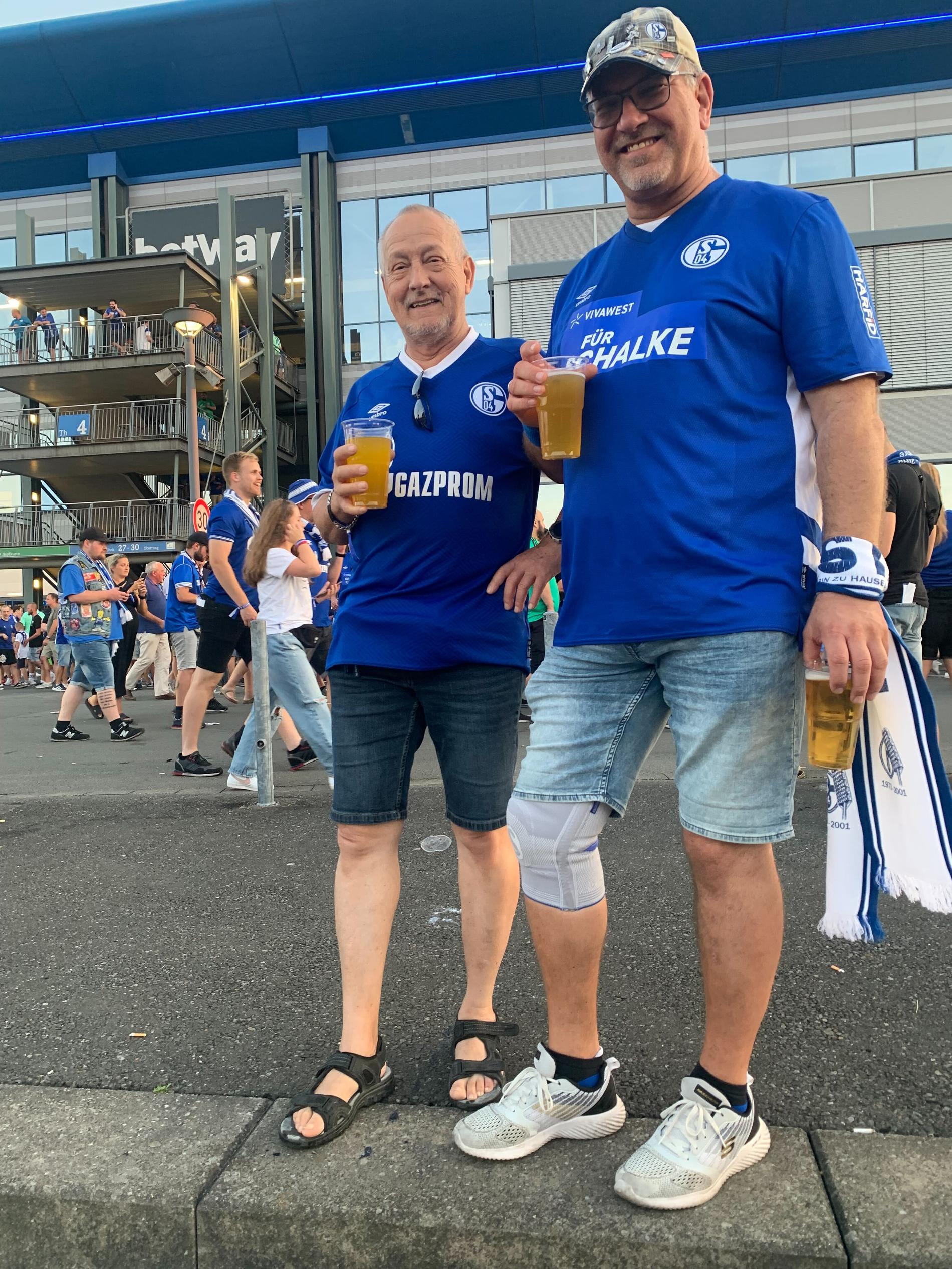Gilsen Church. Schalke 04 supporters are happy with their new take on Sweden.
But they have a call for him.
Flat soon!
August 5th is served Jordan Larson Schalke 04.
Eight days later, I went to Gelsenkirchen and attended the club’s opening match, which would also be the Swede’s debut.
The match has been sold. There is no empty seat when the players are out on the field. Supporters of the house repaired the Tivo. The North Wing is filled with blue and white flags, a huge Schalke sign and the text “You have been declared dead a hundred times – but you always wake up again.” They mean the return of Gelsenkirchen to the German League again.
Schalke 04 lead 1-0 when Jordan Larsson is replaced. The crowd cheers loudly as the announcer calls out the Swede’s first name through the speaker system and fans respond by his last name. Larsson played for 30 minutes, burning the scoring opportunity and after Borussia Moenchengladbach turned around, Schalke scored a point in the 93rd minute.
The fans stay back to pay tribute to their team that never stopped fighting.
When the players leave the field, get out of the stands. Sweaty sausages. Rolf Goller stands with Heinz Thiem just outside the North Exit. Their wives are brothers.
The thermometer showed more than 30 degrees during the day. But Guler, like many other supporters, defied the weather. Shawl scarf included. Wrapped around the left arm.

“there is a problem…”
I introduce myself as a Swedish journalist. As we spoke, Tim said:
– There is a problem with Jordan.
What could it be, I managed to think, but I did not say.
– He has yellow shoes.
Tim smiles when he says it, but he’s still serious. The color of Jordan Larson football boots is not popular. Schalke’s rival, Borussia Dortmund, is strongly associated with the yellow colour. Their shirts are yellow, their badges are yellow, and their standing section is called the Yellow Wall.
In Gelsenkirchen, feelings were so strong that the yellow house, owned by a Dutch landlord, on Schalker Mill, a city street, was vandalized several times with blue paint attached to Schalke.
You have high hopes
Guler holds a beer in each hand. One too many, he notes. Give me one. At the same time I see a bunch of guys still inside the ring area. They walked 20 meters from the exit from the runway and stood in panic in the bush next to three police cars and urinals. Thanks, but no thanks, I answered.
The smell of urine comes with a faint, and infrequent, windy sleep.
Guler says he’s glad Jordan Larson has come to the club. He knows who the Swede’s father is, and he doesn’t know much more than that.
– Everyone knows he is Henrik’s son. He says and I hope he’s as good as his dad.
Choose the legend number
At Schalke, Jordan Larsson plays the number seven shirt. The same number that Father Henrique had at Barcelona and Celtic. But Schalke supporters think of another legendary striker when they see the number.
I hardly have time to say seven before I’m interrupted.
– Big Raul. Raul is ranked seventh, says Guller, referring to the former Real Madrid player who, at the end of his career, spent two seasons at Schalke.
It might seem strange that Raúl made such a big impression in just two years. I’m talking about fans referring to him as “the best in the club’s history” and that he should have even retired from his number. They are unfamiliar with international stars coming to the club. Raul was one of the team’s best players when they reached the Champions League semi-finals in 2010/11. It is Schalke’s best performance in the tournament.
It looks like Guler can still get used to the idea of the Swede wearing the number. But it also requires a lot from Jordan at the time.
– But Henrique is a very good player. He has to show that he can be as good as Raul sometimes, it will be difficult for him.
Yes, says Henrik. For 55-year-old Rolf Guller, Henrik is still the first person he thinks of when he talks about Larson.
So you are a hero here.
I can’t give up what Heinz Tim told me. yellow shoe. Could it be a really big problem? Yes, it seems so. He’s not the only one interacting.
Yellow is not in my vocabulary. There is nothing yellow in my house, and I have no yellow clothes. Its supporter Volker, who also noted the color of the shoes, says that yellow does not exist.
It is not difficult to understand that he is telling the truth. Everything Volcker wears today is in Schalke colors, or very close. The shoes are blue and white. The socks are white and have the Schalke logo on them. The match shirt decorates the torso and denim shorts are blue, not the color of Schalke’s blue, but blue.
Volcker finds it difficult to stand still. He uses his whole body when talking and stands a meter away. Almost all the time. Suddenly he came uncomfortably close. Volcker lowers his voice. Almost ashamed of what he’s going to say.
– I liked it when we were in the second league, whispered.
Volcker talks about last year’s season.
And separates in his answer in the same low tone. Rebekah Volcker, Peter and Karina, who are standing next to us don’t hear what he has to say.
Volker says Schalke, who played in the second division, was the best version Schalke had seen in years. According to him, the fans and the players were one unit.
Schalke is no more complicated than that. No fancy tricks or sweet goals are needed for Jordan Larson to become a crowd favorite. Proponents are only asking for one thing, one thing everyone can actually do.
At Schalke, you can make a lot of mistakes. But if you give it your all, you are a hero here. It is very simple. Volcker says Schalke is very simple.
A city with problems
As a child, Jordan Larson moved between different countries. The place where the Larson family settled was determined according to the career of Father Henrik.
He was born in Rotterdam. He lived in Glasgow for seven years and in Barcelona he was two years old before they moved to Helsingborg.
His career also took him abroad. First Nijmegen in Holland, then to Moscow, Russia.
Now he came to Gelsenkirchen in western Germany. A town famous for its coal mines, the last of which closed four years ago, and which has a soccer team.
Supporters sing about how they sleep under bridges or in homeless shelters funded by German aid organizations.
Gelsenkirchen is an old town, with a lot of problems, says Guller.
He says that Schalke is like the religion of the population. The club is like family to them.
– I like to live here, but it is very difficult to do that too.
Lena Abitzsch, who plays for the newly started women’s team Schalke 04 and grew up in the city, is silent for a moment as she describes Gelsenkirchen. Teammate Fabian Katczynski immediately comes up with a word to sum it up. hideous. Apitzsch agrees. At the same time, you don’t want to be overly negative.
– But the people who live here are very kind, she says.
Schalke is a light in the lives of many of its residents. As well as for many of those who live in North Rhine-Westphalia, the region in which Gelsenkirchen is located.
– If I’m honest…Football is all we have here, says Jonas Bohm, who lives out of town.
Gelsenkirchen is alive tonight
Darkness fell on the Circuit Feltin. 62,271 spectators left the stands.
About 50 people in the area stayed at Charly’s and watched the game late in the evening between Darmstadt and Rostock in the second division. Last year it would have been Schalke.
An old lady has a large plastic bag in which she puts beer cans and bottles that fill the way to the tram, and a shirtless man sits and plays bongo barrels in hopes of raising money.
The stairs to the podium are full of crushed plastic cups. Two stops away, a gang of boys jumped in. They smashed into walls rhythmically and chanted that Schalke would never again let the Bundesliga find their way out of the mouth guards. They didn’t drink their last beer in the evening.
Gelsenkirchen is alive tonight – at least for a few more hours.
